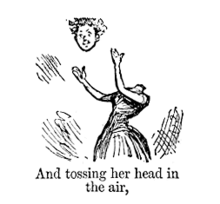Cliché

A cliché (UK: /ˈkliːʃeɪ/ or US: /kliːˈʃeɪ/) is an element of an artistic work, saying, or idea that has become overused to the point of losing its original meaning or effect, even to the point of being weird or irritating, especially when at some earlier time it was considered meaningful or novel.[1] In phraseology, the term has taken on a more technical meaning, referring to an expression imposed by conventionalized linguistic usage.[2]
The term is often used in modern culture for an action or idea that is expected or predictable, based on a prior event. Typically pejorative, "clichés" may or may not be true.[3] Some are stereotypes, but some are simply truisms and facts.[4] Clichés often are employed for comedic effect, typically in fiction.
Most phrases now considered clichéd originally were regarded as striking but have lost their force through overuse.[5] The French poet Gérard de Nerval once said, "The first man who compared woman to a rose was a poet, the second, an imbecile."[6]
A cliché is often a vivid depiction of an abstraction that relies upon analogy or exaggeration for effect, often drawn from everyday experience.[7][8] Used sparingly, it may succeed, but the use of a cliché in writing, speech, or argument is generally considered a mark of inexperience or a lack of originality.
Etymology
The word cliché is borrowed from
Usage

Various dictionaries recognize a derived adjective clichéd, with the same meaning.[13][14][15][16] Cliché is sometimes used as an adjective,[14][15] although some dictionaries do not recognize it as such,[13][16] listing the word only as a noun and clichéd as the adjective.
Thought-terminating cliché
Thought-terminating clichés, also known as thought-stoppers,
The term was popularized by psychiatrist
See also
References
- ISBN 0020130856
- ^ "Cliché - Examples and Definition of Cliché as a writing device". Literary Devices. 2021-01-11. Retrieved 2021-09-30.
- ^ Short Story Library Thick skin and writing, cliché, but true Archived 2010-02-26 at the Wayback Machine - Published By Casey Quinn • May 10th, 2009 • Category: Casey's Corner
- ^ The Free Dictionary - Cliche
- ISBN 0-07-303180-1.
- ^ Quotations of Gérard de Nerval
- ISBN 978-1404862722.
- ^ "Definition of Cliché". Retrieved 3 January 2014.
- ^ a b "cliche". www.etymonline.com. Online Etymology Dictionary. Retrieved 19 May 2019.
- ISBN 1907795138.
- ^ Knight, Edward Henry (1881). Knight's American Mechanical Dictionary: A Description of Tools, Instruments, Machines, Processes, and Engineering; History of Inventions; General Technological Vocabulary; and Digest of Mechanical Appliances in Science and the Arts. Houghton, Mifflin.
- ISBN 1-57990-545-5. Retrieved 2009-07-02.
- ^ a b "cliche". The American Heritage Dictionary of the English Language, Fourth Edition. n.d. Archived from the original on 2005-01-09. Retrieved 2010-10-21.
- ^ a b "cliché". Merriam-Webster Online Dictionary. 2010. Retrieved 2010-02-21.
- ^ a b "cliché". Dictionary.com Unabridged. n.d. Retrieved 2010-02-21.
- ^ ISBN 0-19-861271-0.
- ^ JSTOR 4449551
- Less Wrong. Retrieved 26 Aug 2018.
- ^ ISBN 978-0-19-920478-6.
- ISBN 9781847064806, retrieved October 25, 2016
- ^ Clampitt, Phillip G.; Williams, M. Lee (Winter 2007), "Decision Downloading", MIT Sloan Management Review, vol. 48, no. 2, retrieved October 25, 2016
- ISBN 978-0-8078-4253-9.
- ^ Peterson, Britt (March 19, 2015), "Scientology's enturbulating lingo", Boston Globe, retrieved October 25, 2016
Further reading
- Anton C. Zijderveld (1979). On Clichés: The Supersedure of Meaning by Function in Modernity. Routledge. ISBN 9780710001863.
- Margery Sabin (1987). "The Life of English Idiom, the Laws of French Cliché". The Dialect of the Tribe. Oxford University Press US. pp. 10–25. ISBN 9780195041538.
- Veronique Traverso and Denise Pessah (Summer 2000). "Stereotypes et cliches: Langue, discours, societe". Poetics Today. 21 (3). Duke University Press: 463–465. S2CID 170839666.
- Skorczewski, Dawn (December 2000). ""Everybody Has Their Own Ideas": Responding to Cliche in Student Writing". College Composition and Communication. 52 (2): 220–239. JSTOR 358494.
- Kochin, Michael (2023). "'Life as literature': Wright Morris's Love Among the Cannibals". Textual Practice. 37 (3): 357–372. .
- Ruth Amossy; Lyons (1982). "The Cliché in the Reading Process. Trans. Terese Lyons". SubStance. 11 (2.35). Trans. Terese Lyons. University of Wisconsin Press: 34–45. JSTOR 3684023.
- OCLC 275967.
Mr. Arbuthnot: No sir! Nobody is going to tell me how to run my business. Q: Mr. Arbuthnot, you sound like a Roosevelt hater. A: I certainly am. Q: In that case, perhaps you could give us an idea of some of the cliches your set is in the habit of using in speaking of Mr. Roosevelt ...
